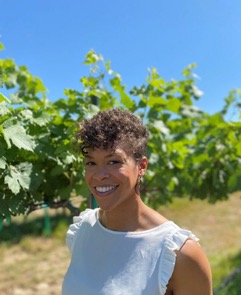Assistant Professor and Extension Specialist

My research focuses on the etiology of diseases and the epidemiology of pathogens destructive to fruit crops in Wisconsin. My lab specializes in applied plant pathology, mycology, chemical control, and stakeholder education. We work with fruit growers in Wisconsin to enhance crop protection practices by identifying disease concerns and optimizing management approaches using an integrated approach.
https://fcpp.plantpath.wisc.edu/
What is your education/career background?
I hold a BS in Biology from New Mexico State University, a MS in Plant Pathology from Washington State University, and a PhD in Plant Pathology from the University of California, Davis. My graduate work focused on the study of fungal disease complexes that impact perennial fruit cropping systems. I started my position at UW-Madison in 2020 where I have expanded my research to include the study and management of fungal, bacterial, and viral diseases of fruit cropping systems.
How have you navigated a career in STEM as a woman/underrepresented minority?
Navigating a career in STEM as a black woman has frequently been an isolating experience. Connecting with other women in science has been very transformative for me. Sharing, listening, and learning from other women in science at different stages of their careers has helped me grow as a professional and a scientist. These connections have also created a space where I have the resources and support to successfully navigate my career in STEM.
What advice do you have for women/underrepresented groups pursuing an education/career in STEM?
Find good mentors and surround yourself with members of a community where you feel seen, heard, and supported!
What do you enjoy most about your career/current role?
I enjoy collaborating with other researchers and stakeholders to develop research projects that address high impact issues in my field. The collaboration of multidisciplinary teams to address significant issues, coupled with witnessing my colleagues contribute their expertise, is a fun part of my job. Utilizing a multidisciplinary approach enables us to tackle problems from various perspectives, which often leads to innovative solutions.
What does diversity, inclusivity, and equity look like to you in your job sector? How do you incorporate DEI in your position?
DEI in my job sector can take many forms. One way I often incorporate this is thinking about the diversity of values and priorities of the people I work with. This informs the development and evaluation of our lab policies and procedures. Additionally, using inclusive language in my communications (written or oral) ensures that I reach broad audiences to connect with people who will benefit from the work my lab conducts.
Understanding that the people I work with are individuals with unique needs and interests, means that I meet them where they are at. Tailoring the mentorship of students to each individual student has brought a lot of value and connectedness to my research program. Furthermore, I appreciate the input from the students in my lab and ask for their feedback often.
What is your favorite way to unwind?
Mug of tea and a good book to read!
X/Twitter: @LeslieHolland_